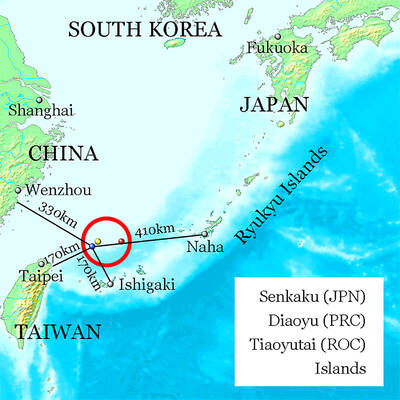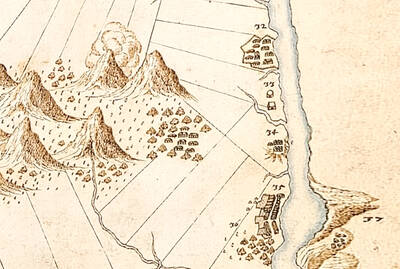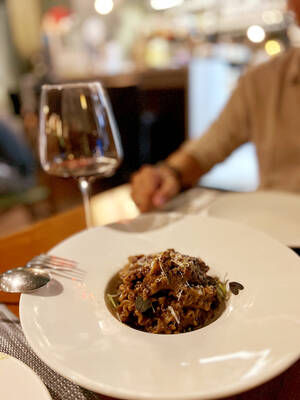Crooner Leo Ku (古巨基) clinched the biggest prize of the Hong Kong music awards season, helped by the popularity of Loved Too Late, a song that encourages people to express their appreciation for loved ones.
Ku was awarded the Four Electronic Media Syndicated Award on Saturday at Hong Kong's fourth and final music awards ceremony of the season, the Top Ten Chinese Gold Songs Award organized by government-owned radio RTHK. The prize goes to the most decorated singer of the awards season.
Ku urged more harmony among pop stars in an industry whose record sales have been hurt by the spread of digital music.

PHOTO: TAIPEI TIMES
"Come the awards season there's always talk of singer A and singer B being bitter enemies or singer C and singer D battling it out. I'd like to say there shouldn't be any bitter enemies in the Hong Kong music industry. We're all comrades,'' he said.
Joey Yung (容祖兒) was another big winner at Saturday's Chinese Gold Songs awards ceremony, named best female singer and best-selling female singer in Hong Kong and most popular in mainland China.
Veteran actor-singer Andy Lau (劉德華) was China's most popular male singer. In Hong Kong, Hacken Lee (李克勤) was the best-selling male pop star and Eason Chan was named the best male singer.
Ku's Loved Too Late won the Global Chinese Gold Song Award, which was decided by Internet voting and reviews from Chinese radio stations around the world.
The most popular song in China was Thousand Miles Away, a duet by Jay Chou (周杰倫) and fellow Taiwanese singer Fei Yu-ching (費玉清).
The Golden Needle lifetime achievement award went to Adam Cheng (鄭少秋), who wore a cowboy hat and a leather trench coat while performing sexy choreography with female dancers dressed in gold bikinis and shorts with a leopard skin pattern.
Cheng and guest performer veteran Taiwanese singer Tsai Chin (蔡琴) urged fellow singers to value quality over quantity. The Chinese pop music industry is known for its prolific output.
"Don't release albums when there aren't any good songs available," Tsai said.
"The music industry is very diverse. There are all types of singers. But I think the most important thing is to strive for quality," said Cheng, who has released 46 albums, made 46 movies and 72 TV series.

Last week gave us the droll little comedy of People’s Republic of China’s (PRC) consul general in Osaka posting a threat on X in response to Japanese Prime Minister Sanae Takaichi saying to the Diet that a Chinese attack on Taiwan may be an “existential threat” to Japan. That would allow Japanese Self Defence Forces to respond militarily. The PRC representative then said that if a “filthy neck sticks itself in uninvited, we will cut it off without a moment’s hesitation. Are you prepared for that?” This was widely, and probably deliberately, construed as a threat to behead Takaichi, though it

Nov. 17 to Nov. 23 When Kanori Ino surveyed Taipei’s Indigenous settlements in 1896, he found a culture that was fading. Although there was still a “clear line of distinction” between the Ketagalan people and the neighboring Han settlers that had been arriving over the previous 200 years, the former had largely adopted the customs and language of the latter. “Fortunately, some elders still remember their past customs and language. But if we do not hurry and record them now, future researchers will have nothing left but to weep amid the ruins of Indigenous settlements,” he wrote in the Journal of

Even after years in business, weekend tables here can be booked out a month in advance. The price point far exceeds its competitors. Granted, expectations are soaringly high, but something here failed to hit the high notes. There are a few telltale signs that a restaurant relies solely on outstanding food to create the experience, no gimmicks or distractions needed. La Mole is such a restaurant. The atmosphere is food-forward, with an open kitchen center stage. Our tables are simple; no candles, no dim lighting, no ambient music. The menu is brief, and our waiter directs most

If China attacks, will Taiwanese be willing to fight? Analysts of certain types obsess over questions like this, especially military analysts and those with an ax to grind as to whether Taiwan is worth defending, or should be cut loose to appease Beijing. Fellow columnist Michael Turton in “Notes from Central Taiwan: Willing to fight for the homeland” (Nov. 6, page 12) provides a superb analysis of this topic, how it is used and manipulated to political ends and what the underlying data shows. The problem is that most analysis is centered around polling data, which as Turton observes, “many of these